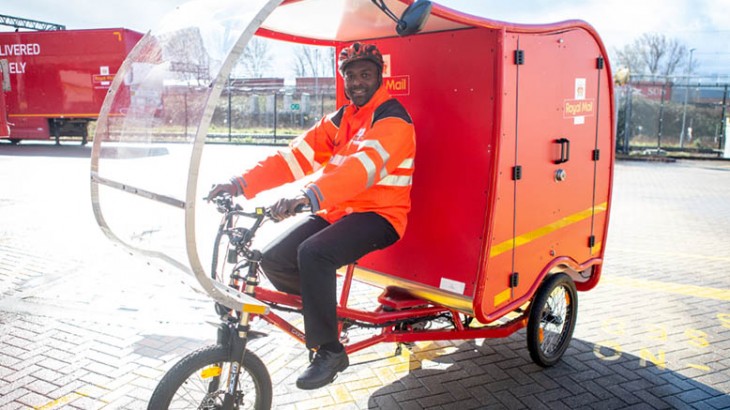Green streak

The government is subsidising electric bike purchases for companies that are making last mile deliveries.
Organisations can apply online for the Department for Transport’s (DfT’s) ecargo bike grant, which will cover up to 20% of the total cost of an ecargo vehicle up to a maximum of £1,000 per bike.
The scheme is worth £2 million overall, with applications capped at 50 ecargo bikes or £50,000 per organisation. The scheme is available for a range of vehicles, including trailers, tricycles and quadricycles. There are minimum size restrictions, although these may be waived if the vehicles are suitable for commercial use, as well as requirements for rider training.
Electric bikes combine pedal power with battery assistance. Provided they meet certain requirements they are classed as a normal pedal bike, allowing riders to use them on cycle paths.
In March, we conducted our first-ever trial of zero-emission e-trikes for letter and parcel deliveries. As a further example of our continued efforts to reduce CO2 emissions associated with our operations, six-month trials are ongoing in Stratford (East London), Cambridge and Sutton Coldfield. Once the trial period has ended, we will make a decision on whether to expand the trikes more widely across the UK.
French postal group La Poste, which has the largest fleet of electric vehicles in the world, has had around 25,000 electrically-assisted bicycles for some time now. But a number of other delivery companies are starting to follow suit. DHL is using them alongside boats on the Amsterdam canals and plans to switch to ‘clean transport modes’ for 70% of their first-and-last mile deliveries by 2025. Dutch supermarket chain Albert Heijn is delivering products for free via electric bikes as part of a partnership with a local smartphone app, and in Portland, Seattle, and Pittsburgh, UPS is rolling out an e-trike pilot, which if successful, it hopes to replicate throughout the United States.
As a company, we are committed to making changes to our operations to reduce our environmental impact, whilst ensuring we continue to meet customer expectations. Emissions are an important issue and we are continuously looking at new and innovative ways to reduce our carbon footprint. Our ambition is to move to a low-carbon fleet and ensure that we are investing in a fleet that meets future legislation.



